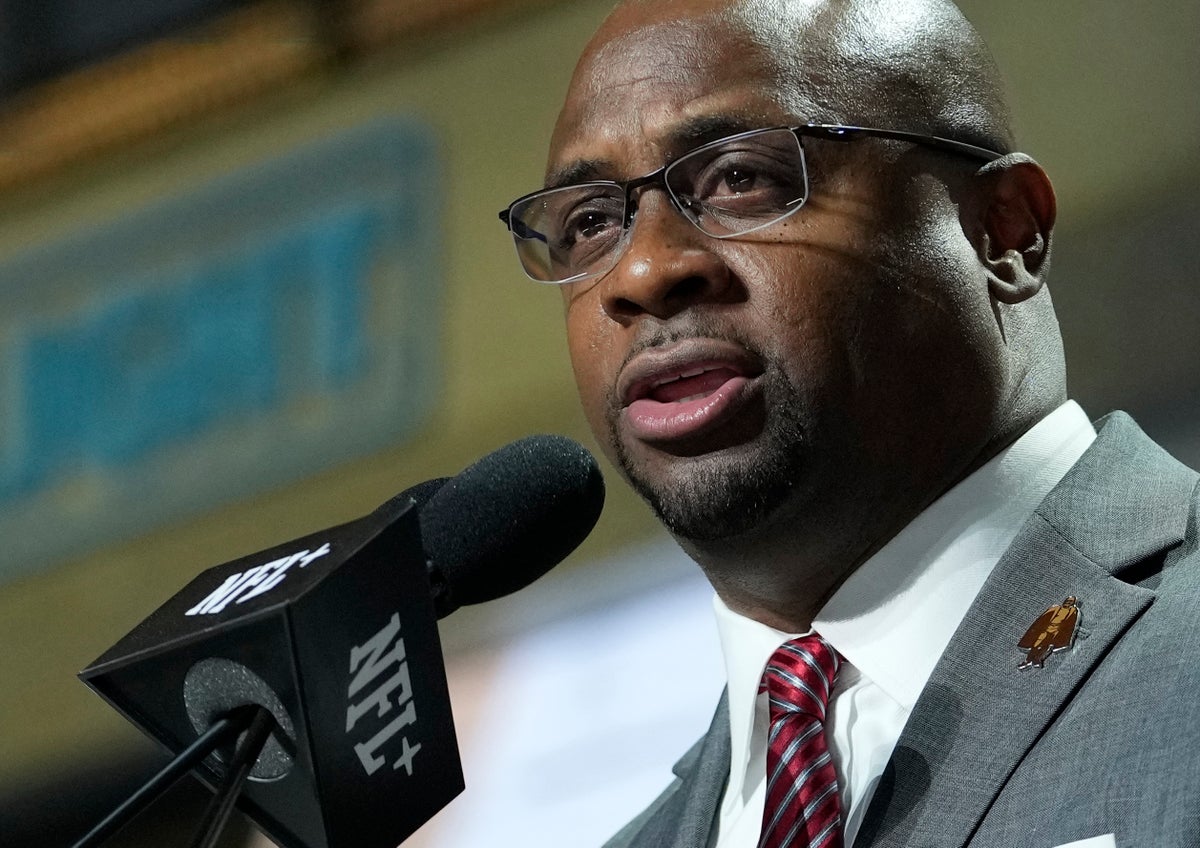
Having spent his adult life speaking out against domestic abuse, NFL Vice President Troy Vincent recently began wondering if he needed to modify his message to reach a younger audience.
What concerned him were the worrisome statistics showing gender-based violence being as prevalent — if not more — in today’s society as it was when an 8-year-old Vincent and his younger brother huddled in a closet to seek shelter and shut out the sounds of their mother getting beaten by her boyfriend.
“I’m at the what, almost 30-year point in this space, and I look at the CDC numbers and we’ve got a long way to go,” Vincent told The Associated Press.
“And I feel I have more questions than answers now,” he added. “I’m a 52-year-old now that has to evolve even in this particular area. But I need to make sure that I am connecting based off what the research says on how these young men or young women would like to be engaged.”
The research he referred to is joining his wife Tommi, chairwoman of the National Domestic Violence Hotline, in establishing the Vincent Commission, and partnering with Niagara University to launch a year-long study focused on how to reshape the narrative and identify new approaches.
The study’s aim, which Vincent announced Wednesday, is to gain a better understanding of what may trigger young men toward violence and specifically on campuses, where college women between the ages of 18 and 24 are three times more likely to be victims of abuse, according to the Rape, Abuse and Incest National Network.
“Those closest to the problems are those closest to the solutions. And engaging with that audience properly, with the right framing of questions, it may allow us to get to a better place,” Vincent said.
Though no college campus is immune to abuse and the crisis not limited to sports programs, Vincent said involving student-athletes helps raise awareness because they generally have higher-profile platforms to speak out on the issue.
Vincent said this is a personal initiative with his wife, and not backed by the NFL, though the league and other schools should benefit, and may eventually become involved.
Niagara was selected because Vincent previously collaborated with the school on domestic violence issues during his time playing with the Buffalo Bills, and with the university featuring a Department of Justice-funded program on violence prevention and education.
Lead researcher and Niagara associate professor Jennifer Beebe said the study’s focus on men in leadership roles has the potential to move the needle in finding what she called “the right questions to ask.”
It’s not that the previous questions were wrong, she said, before outlining an ongoing disconnect by noting no one supports domestic abuse at the same time women are still being victimized. According to the CDC, one in three women experience severe physical violence from an intimate partner in their lifetime.
“It’s still happening, so what are we doing or not doing that needs to stop or change?” Beebe said. “It’s really a cultural conversation.”
By heightening awareness among male athletes, Beebe wondered if a similar study could have led to someone at Michigan State speaking up earlier against Larry Nasser, the doctor who used his position at the school and USA Gymnastics to sexually assault hundreds of children and young women over nearly two decades.
“Our collaboration right now is standing up and saying, `Enough,’” Beebe said of a program in which participants will hear directly from survivors of abuse, including what Vincent endured as a child.
“His courage to share his story will let others share their stories and give them the courage to step forward,” she said. “And hopefully, it will help others to maybe seek help if they need it regarding anger, emotions, maybe some unfinished childhood trauma that they need to work through.”
The study is expected to take between 12 and 18 months, with the findings used to establish new policies and create an educational program for use at other schools.
“We have a sense of what works, but this really gives us a chance to work with Troy and two of our faculty members to sharpen and deepen and have a clearer evidence-based approach,” Niagara University President James Maher said. He noted the study’s timing is also important coming out of the COVID-19 pandemic, in which lockdowns led to an increase in domestic abuse because women were unable to escape their homes.
“What we’ve learned through COVID is we are social animals, and we need human relationships like we need air and we need water,” Maher said, while also noting many teenagers became dependent on social media and their electronic devices. “This is a great opportunity for us to go back to the basics of life. We need community. We need healthy human relationships. We need connection.”







